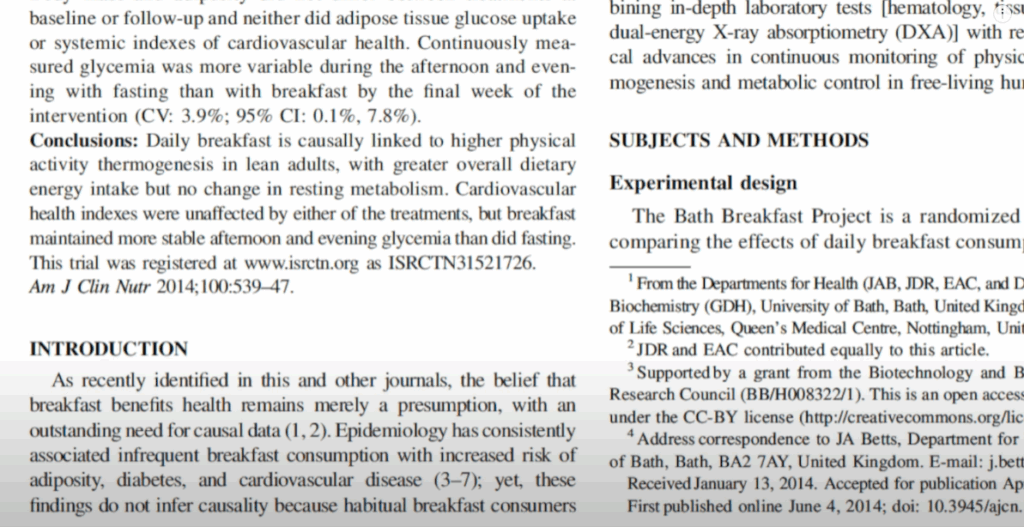For decades, we have been told that breakfast is the “most important meal of the day.” This idea has been deeply ingrained in our cultural consciousness, promoted by everything from cereal commercials to well-meaning health advice. But as a coach with extensive experience in nutrition and training, I’ve learned to question conventional wisdom and look for what the science truly says. The notion that you must eat breakfast to be healthy and fit is one of the most persistent myths I encounter.
Let’s dismantle this belief and explore what the latest research tells us about meal timing, metabolism, and body composition. The truth is, the decision to eat breakfast or skip it is far less critical than we’ve been led to believe. It comes down to individual preference, lifestyle, and how you structure your overall nutrition plan.

The Historical Roots of a Modern Myth
The idea that breakfast is essential is not a new one; in fact, its origins are more commercial than scientific. The narrative gained significant traction in the early 20th century, thanks in large part to figures like John Harvey Kellogg. As an editor for Good Health magazine and the inventor of cornflakes, Kellogg had a clear financial incentive to promote breakfast consumption. His articles, published as early as 1917, positioned breakfast as a non-negotiable part of a healthy day, without providing any scientific evidence to back the claim.
The logic seemed sound enough at the time: a morning meal provides the energy and nutrients needed to kickstart your day. However, modern scientific inquiry has shown that the human body is far more adaptable than we give it credit for. When it comes to nutrition, what matters most is the total daily intake of calories, protein, and micronutrients, not necessarily when you consume them.
Breakfast and Metabolism: The ‘Metabolic Furnace’ Theory
One of the most enduring arguments for eating breakfast is that it “stokes the metabolic furnace,” boosting your metabolism for the rest of the day. This theory suggests that skipping the morning meal leaves your metabolism sluggish, making it harder to burn fat.
A closer look at the research, however, reveals that this is not the case. Studies have consistently shown no significant difference in resting metabolic rate between people who eat breakfast and those who skip it. While eating does cause a temporary increase in metabolism due to the thermic effect of food (the energy required to digest and process nutrients), this effect is tied to the meal itself. Spreading your daily calories across three meals doesn’t produce a greater thermic effect than consuming them in two. The total thermic effect of your daily food intake remains the same, regardless of the meal timing.
Interestingly, some research has shown that individuals who skip breakfast may burn fewer calories through non-exercise activity thermogenesis (NEAT), which includes everything from fidgeting to walking around the office. The body may unconsciously reduce these activities to conserve energy when it perceives a caloric deficit. While this might seem like a point against skipping breakfast, it’s just one piece of the puzzle.

Caloric Balance: The Ultimate Determinant of Weight
For anyone looking to lose or gain weight, the most important principle is net energy balance—the relationship between the calories you consume and the calories you burn. The research on breakfast skipping and weight loss is remarkably clear on this point.
While it is true that people who skip breakfast often overeat later in the day, this compensatory eating is rarely enough to make up for the calories they missed in the morning. Studies have demonstrated that on a typical day, a person who skips breakfast consumes significantly fewer total calories than a person who eats it. The deficit from the skipped meal is larger than the calories consumed from compensatory overeating. This is why, in the long run, there’s often no substantial difference in weight change between breakfast eaters and breakfast skippers. The slight reduction in NEAT among breakfast skippers tends to be balanced out by their overall lower caloric intake.
From a coaching perspective, this provides a powerful insight: the “best” meal schedule is the one that allows you to consistently adhere to your dietary goals. For some, eating a satisfying breakfast is key to controlling hunger and avoiding excessive snacking later. For others, whose appetite is naturally low in the morning, skipping breakfast allows them to save their calories for later in the day when they feel hungrier, making their diet feel more sustainable. The choice is personal and should be based on what works best for your hunger patterns and schedule.
Muscle Mass and Performance: Strategic Meal Timing
While general weight loss is primarily a matter of caloric balance, the nuances of bodybuilding and muscle growth introduce other factors to consider. For a bodybuilder, the timing of meals can impact both training performance and muscle protein synthesis.
- Training Performance: If your workout is in the morning, eating a carbohydrate-rich breakfast beforehand can be a game-changer. A pre-workout meal provides the glycogen and energy stores your muscles need to perform at their peak. This can lead to greater strength and endurance, allowing for a more effective training session. However, if you train later in the day or find you perform well in a fasted state, this point becomes moot. The most important thing is to fuel your body for your most intense physical activity, whenever that occurs.
- Muscle Protein Synthesis (MPS): For building muscle, consistently stimulating muscle protein synthesis throughout the day is key. This is best achieved by consuming 4-5 meals containing at least 20-40 grams of protein each. If you skip breakfast and eat your first meal at noon, you can still easily fit in 4-5 meals by eating every 3-4 hours until bedtime. However, extreme delays—such as narrowing your eating window to just 4-6 hours—could make it difficult to hit your protein and meal frequency targets, potentially reducing your muscle-building potential.
The most critical factor, however, remains your total daily protein intake. As long as you are consuming an adequate amount of protein (e.g., 0.8-1.2 grams per pound of body weight), the exact timing of those meals likely has a minimal impact on muscle growth.

General Health and Micronutrient Intake
Finally, let’s address the relationship between breakfast and overall health. Numerous observational studies have found a correlation between skipping breakfast and an increased risk of obesity, type 2 diabetes, and cardiovascular disease. However, correlation does not equal causation.
These studies are often confounded by lifestyle variables. People who regularly eat breakfast also tend to have other healthy habits: they are more likely to exercise, less likely to smoke, and often consume more fiber and micronutrients. It’s unclear whether breakfast is the cause of their good health or simply a marker of a healthy lifestyle.
For most healthy adults, if a meal-skipping approach allows you to achieve your fitness and health goals, there’s little evidence to suggest it’s harmful. The only real caveat is for children and growing adolescents, for whom regular meals are crucial for proper development and establishing a healthy relationship with food. For this demographic, skipping any meal is strongly discouraged.
In conclusion, the myth of breakfast being the “most important meal” is largely a relic of early 20th-century marketing. The latest science shows that your total daily caloric and macronutrient intake, along with the consistency of your diet and training, is what truly matters. Whether you choose to eat breakfast or not should be a personal decision based on your own appetite, schedule, and adherence to your long-term goals. The best diet is the one you can stick to.



